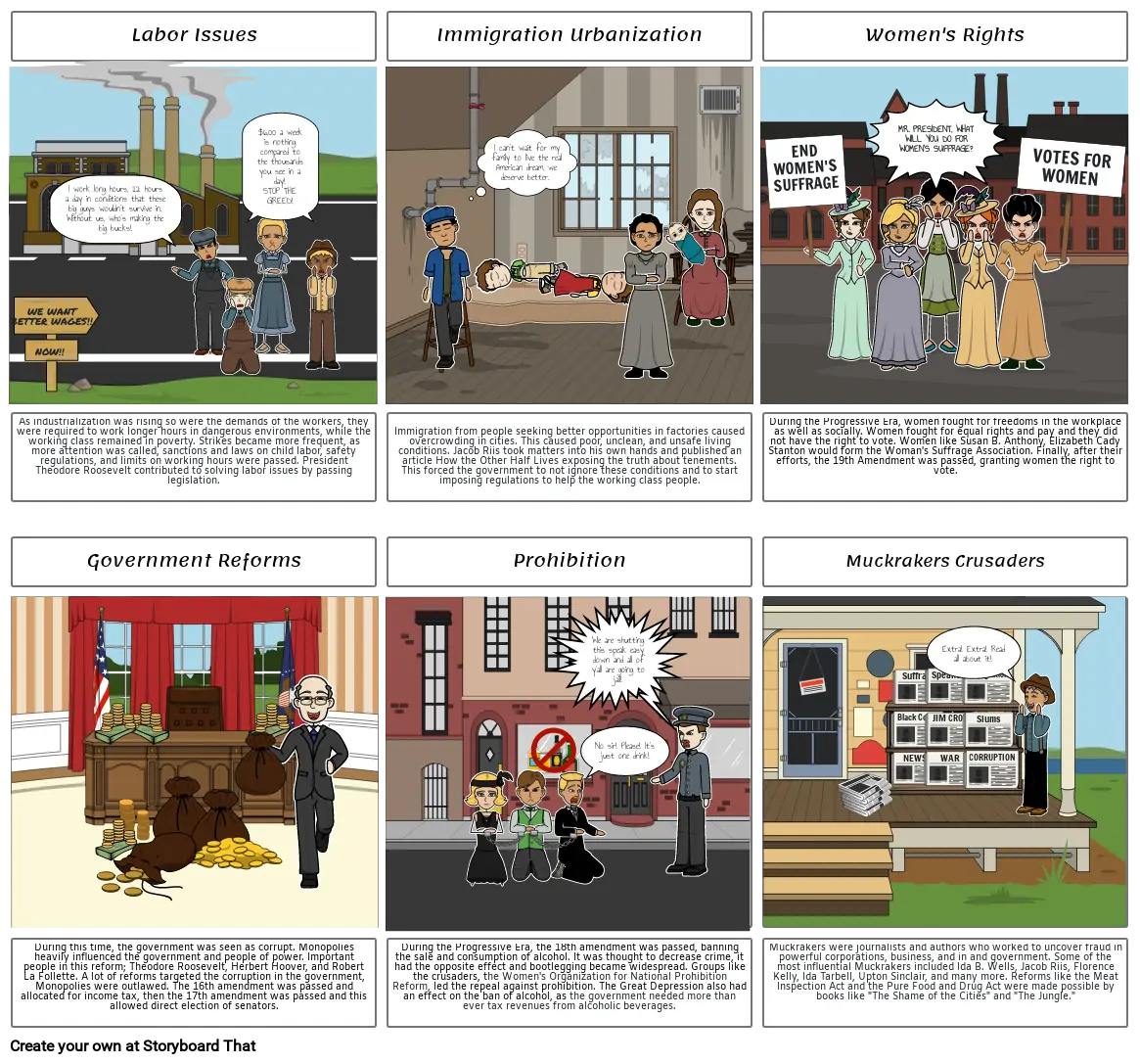Progressive Era

Storyboard Text
- NOW!!
- WE WANT BETTER WAGES!!
- Labor Issues
- I work long hours, 12 hours a day in conditions that these big guys wouldn't survive in. Without us, who's making the big bucks!
- $6.00 a week is nothing compared to the thousands you see in a day!STOP THE GREED!
- Immigration Urbanization
- I can't wait for my family to live the real American dream, we deserve better.
- Women's Rights
- END WOMEN'S SUFFRAGE
- MR. PRESIDENT, WHAT WILL YOU DO FOR WOMEN'S SUFFRAGE?
- VOTES FOR WOMEN
- As industrialization was rising so were the demands of the workers, they were required to work longer hours in dangerous environments, while the working class remained in poverty. Strikes became more frequent, as more attention was called, sanctions and laws on child labor, safety regulations, and limits on working hours were passed. President Theodore Roosevelt contributed to solving labor issues by passing legislation.
- Government Reforms
- Immigration from people seeking better opportunities in factories caused overcrowding in cities. This caused poor, unclean, and unsafe living conditions. Jacob Riis took matters into his own hands and published an article How the Other Half Lives exposing the truth about tenements. This forced the government to not ignore these conditions and to start imposing regulations to help the working class people.
- Prohibition
- We are shutting this speak easy down and all of y'all are going to jail!
- During the Progressive Era, women fought for freedoms in the workplace as well as socially. Women fought for equal rights and pay and they did not have the right to vote. Women like Susan B. Anthony, Elizabeth Cady Stanton would form the Woman's Suffrage Association. Finally, after their efforts, the 19th Amendment was passed, granting women the right to vote.
- Muckrakers Crusaders
- Suffrage
- Speakeasy
- Extra! Extra! Read all about it!
- Immigration
- During this time, the government was seen as corrupt. Monopolies heavily influenced the government and people of power. Important people in this reform; Theodore Roosevelt, Herbert Hoover, and Robert La Follette. A lot of reforms targeted the corruption in the government, Monopolies were outlawed. The 16th amendment was passed and allocated for income tax, then the 17th amendment was passed and this allowed direct election of senators.
- During the Progressive Era, the 18th amendment was passed, banning the sale and consumption of alcohol. It was thought to decrease crime, it had the opposite effect and bootlegging became widespread. Groups like the crusaders, the Women's Organization for National Prohibition Reform, led the repeal against prohibition. The Great Depression also had an effect on the ban of alcohol, as the government needed more than ever tax revenues from alcoholic beverages.
- No sir! Please! It's just one drink!
- Muckrakers were journalists and authors who worked to uncover fraud in powerful corporations, business, and in and government. Some of the most influential Muckrakers included Ida B. Wells, Jacob Riis, Florence Kelly, Ida Tarbell, Upton Sinclair, and many more. Reforms like the Meat Inspection Act and the Pure Food and Drug Act were made possible by books like The Shame of the Cities and The Jungle.
- Black Codes
- NEWS
- WAR
- JIM CROW
- Slums
- CORRUPTION
Over 30 Million Storyboards Created
No Downloads, No Credit Card, and No Login Needed to Try!

